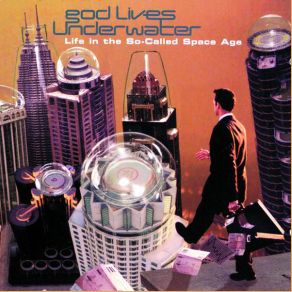Life in the So-Called Space Age
Download links and information about Life in the So-Called Space Age by God Lives Underwater. This album was released in 1998 and it belongs to Rock, Metal, Alternative genres. It contains 11 tracks with total duration of 01:12:33 minutes.

|
|
|---|---|
| Artist: | God Lives Underwater |
| Release date: | 1998 |
| Genre: | Rock, Metal, Alternative |
| Tracks: | 11 |
| Duration: | 01:12:33 |
| Buy it NOW at: | |
| Buy on iTunes $4.99 | |
| Buy on Amazon $4.99 | |
Tracks
[Edit]| No. | Title | Length |
|---|---|---|
| 1. | Intro | 0:59 |
| 2. | Rearrange | 3:33 |
| 3. | From Your Mouth | 4:43 |
| 4. | Can't Come Down | 5:05 |
| 5. | Alone Again | 3:18 |
| 6. | Behavior Modification | 3:55 |
| 7. | The Rush Is Loud | 4:08 |
| 8. | Dress Rehearsal for Reproduction | 4:25 |
| 9. | Happy? | 5:13 |
| 10. | Vapors | 4:50 |
| 11. | Medicated to the One I Love | 32:24 |
Details
[Edit]If it wasn't clear enough before, God Lives Underwater fully nailed their colors to the Depeche Mode fan mast in 1998 with not one but two nods to that band's astonishing Black Celebration album. Besides covering "Fly on the Windscreen" for the Music for the Masses tribute album, the group named its full new album after the slogan found in Black Celebration's artwork. Unsurprisingly the record itself had that connection in the music as well — "Rearrange," the first full track after a brief introduction, has a synth line that's just as obviously in debt to Depeche as the closing synth break on Nine Inch Nails' "Closer," say. None of this is to belittle the album; if anything, rather than simply cloning Depeche's own style in the fashion of bands like Camouflage, the integration of that approach with God Lives Underwater's own murky rock is even better than before. "Alone Again," possibly a thematic sequel to the debut EP's "Lonely Again," though it doesn't immediately sound like it, plays down the guitars in favors of the beats and wiry, edgy keyboard lines, a balance repeated to even more haunting effect on "Happy?," with its acoustic guitar-touched intro and distanced, echoed feeling. Many other songs similarly let the electronics take the fore, while more than once the band fully drop the guitars entirely in favor of melancholy soundscapes and melodies, though nearly often with the band's own brand of full-bodied rock/funk rhythms. Reilly's singing is much less forced than before (and it should be noted he's never tried to simply ape David Gahan, likely due to his higher register), while more explicit hip-hop approaches (scratching, not just breakbeats and loops) add further to the overall flavor. One of the odder but more enjoyable tracks, "The Rush Is Loud," explicitly talks about the songwriting and recording process against a rough electro/industrial arrangement, Reilly's hushed singing an interesting contrast to the music.